Rust: Systems Programming for Everyone
Felix Klock (@pnkfelix), Mozilla
space: next slide; esc: overview; arrows navigate http://bit.ly/1LQM3PS
Why ...?
Why use Rust?
- Fast code, low memory footprint
- Go from bare metal (assembly; C FFI) ...
... to high-level (collections, closures, generic containers) ...with zero cost (no GC, unboxed closures, monomorphization of generics)
- Safety and Parallelism
Safety and Parallelism
Safety
No segmentation faults
No undefined behavior
No data races
(Multi-paradigm) Parallelism
msg passing via channels
shared state via
Arcand atomics,Mutex, etcuse native threads... or scoped threads... or work-stealing...
Why would you (Felix) work on Rust?
It's awesome!
(Were prior slides really not a sufficient answer?)
oh, maybe you meant ...
Why would Mozilla sponsor Rust?
- Hard to prototype research-y browser changes atop C++ code base
- Rust ⇒ Servo, WebRender
- Want Rust for next-gen infrastructure (services, IoT)
"Our mission is to ensure the Internet is a global public resource, open and accessible to all. An Internet that truly puts people first, where individuals can shape their own experience and are empowered, safe and independent."
- "accessible to all"
Where is Rust now?
1.0 release was back in May 2015
Rolling release cycle (up to Rust 1.7 as of March 2nd 2016)
Open source from the begining
https://github.com/rust-lang/rust/Open model for future change (RFC process)
https://github.com/rust-lang/rfcs/Awesome developer community (~1,000 people in
#rust, ~250 people in#rust-internals, ~1,300 unique commiters to rust.git)
Talk plan
- "Why Rust" Demonstration
- "Ownership is easy" (... or is it?)
Sharing Stuff Sharing capabilities (Language stuff) Sharing work (Parallelism stuff) Sharing code (Open source distribution stuff)
Lightning Demo
Demo: sequential web page fetch
fn sequential_web_fetch() {
use hyper::{self, Client};
use std::io::Read; // pulls in `chars` method
let sites = &["http://www.eff.org/", "http://rust-lang.org/",
"http://imgur.com", "http://mozilla.org"];
for &site in sites { // step through the array...
let client = Client::new();
let res = client.get(site).send().unwrap();
assert_eq!(res.status, hyper::Ok);
let char_count = res.chars().count();
println!("site: {} chars: {}", site, char_count);
}
}(lets get rid of the Rust-specific pattern binding in for; this is not a tutorial)
Demo: sequential web page fetch
fn sequential_web_fetch() {
use hyper::{self, Client};
use std::io::Read; // pulls in `chars` method
let sites = &["http://www.eff.org/", "http://rust-lang.org/",
"http://imgur.com", "http://mozilla.org"];
for site_ref in sites { // step through the array...
let site = *site_ref; // (separated for expository purposes)
{ // (and a separate block, again for expository purposes)
let client = Client::new();
let res = client.get(site).send().unwrap();
assert_eq!(res.status, hyper::Ok);
let char_count = res.chars().count();
println!("site: {} chars: {}", site, char_count);
}
}
}Demo: concurrent web page fetch
fn concurrent_web_fetch() -> Vec<::std::thread::JoinHandle<()>> {
use hyper::{self, Client};
use std::io::Read; // pulls in `chars` method
let sites = &["http://www.eff.org/", "http://rust-lang.org/",
"http://imgur.com", "http://mozilla.org"];
let mut handles = Vec::new();
for site_ref in sites {
let site = *site_ref;
let handle = ::std::thread::spawn(move || {
// block code put in closure: ~~~~~~~
let client = Client::new();
let res = client.get(site).send().unwrap();
assert_eq!(res.status, hyper::Ok);
let char_count = res.chars().count();
println!("site: {} chars: {}", site, char_count);
});
handles.push(handle);
}
return handles;
}Print outs
Sequential version:
site: http://www.eff.org/ chars: 42425
site: http://rust-lang.org/ chars: 16748
site: http://imgur.com chars: 152384
site: http://mozilla.org chars: 63349(on every run, when internet, and sites, available)
Concurrent version:
site: http://imgur.com chars: 152384
site: http://rust-lang.org/ chars: 16748
site: http://mozilla.org chars: 63349
site: http://www.eff.org/ chars: 42425(on at least one run)
"what is this 'soundness' of which you speak?"
Demo: soundness I
fn sequential_web_fetch_2() {
use hyper::{self, Client};
use std::io::Read; // pulls in `chars` method
let sites = &["http://www.eff.org/", "http://rust-lang.org/",
// ~~~~~ `sites`, an array (slice) of strings, is stack-local
"http://imgur.com", "http://mozilla.org"];
for site_ref in sites {
// ~~~~~~~~ `site_ref` is a *reference to* elem of array.
let client = Client::new();
let res = client.get(*site_ref).send().unwrap();
// moved deref here ~~~~~~~~~
assert_eq!(res.status, hyper::Ok);
let char_count = res.chars().count();
println!("site: {} chars: {}", site_ref, char_count);
}
}Demo: soundness II
fn concurrent_web_fetch_2() -> Vec<::std::thread::JoinHandle<()>> {
use hyper::{self, Client};
use std::io::Read; // pulls in `chars` method
let sites = &["http://www.eff.org/", "http://rust-lang.org/",
// ~~~~~ `sites`, an array (slice) of strings, is stack-local
"http://imgur.com", "http://mozilla.org"];
let mut handles = Vec::new();
for site_ref in sites {
// ~~~~~~~~ `site_ref` still a *reference* into an array
let handle = ::std::thread::spawn(move || {
let client = Client::new();
let res = client.get(*site_ref).send().unwrap();
// moved deref here ~~~~~~~~~
assert_eq!(res.status, hyper::Ok);
let char_count = res.chars().count();
println!("site: {} chars: {}", site_ref, char_count);
// Q: will `sites` array still be around when above runs?
});
handles.push(handle);
}
return handles;
}some (white) lies: "Rust is just about ownership"
"Ownership is intuitive"
"Ownership is intuitive"
Let's buy a car
let money: Money = bank.withdraw_cash();
let my_new_car: Car = dealership.buy_car(money);let second_car = dealership.buy_car(money); // <-- cannot reusemoney transferred into dealership, and car transferred to us.
"Ownership is intuitive"
Let's buy a car
let money: Money = bank.withdraw_cash();
let my_new_car: Car = dealership.buy_car(money);
// let second_car = dealership.buy_car(money); // <-- cannot reusemoney transferred into dealership, and car transferred to us.
my_new_car.drive_to(home);
garage.park(my_new_car);my_new_car.drive_to(...) // now doesn't work(can't drive car without access to it, e.g. taking it out of the garage)
"Ownership is intuitive"
Let's buy a car
let money: Money = bank.withdraw_cash();
let my_new_car: Car = dealership.buy_car(money);
// let second_car = dealership.buy_car(money); // <-- cannot reusemoney transferred into dealership, and car transferred to us.
my_new_car.drive_to(home);
garage.park(my_new_car);
// my_new_car.drive_to(...) // now doesn't work(can't drive car without access to it, e.g. taking it out of the garage)
let my_car = garage.unpark();
my_car.drive_to(work);...reflection time...
Correction: Ownership is intuitive, except for programmers ...
(copying data like integers, and characters, and .mp3's, is "free")
... and anyone else who names things
Über Sinn und Bedeutung
("On sense and reference" -- Gottlob Frege, 1892)
If ownership were all we had, car-purchase slide seems nonsensical
my_new_car.drive_to(home);Does this transfer home into the car?
Do I lose access to my home, just because I drive to it?
We must distinguish an object itself from ways to name that object
Above,
homecannot be (an owned)Homehomemust instead be some kind of reference to aHome
So we will need references
We can solve any problem by introducing an extra level of indirection
-- David J. Wheeler
a truth: Ownership is important
Ownership is important
| Ownership enables: | which removes: |
|---|---|
| RAII-style destructors | a source of memory leaks (or fd leaks, etc) |
| no dangling pointers | many resource management bugs |
| no data races | many multithreading heisenbugs |
Do I need to take ownership here, accepting the associated resource management responsibility? Would temporary access suffice?
Good developers ask this already!
Rust forces function signatures to encode the answers
(and they are checked by the compiler)
Sharing Data: Ownership and References
Rust types
| Move | Copy | Copy if T:Copy |
|---|---|---|
Vec<T>, String, ... |
i32, char, ... |
[T; n], (T1,T2,T3), ... |
struct Car { color: Color, engine: Engine }
fn demo_ownership() {
let mut used_car: Car = Car { color: Color::Red,
engine: Engine::BrokenV8 };
let apartments = ApartmentBuilding::new();references to data (&mut T, &T):
let my_home: &Home; // <-- an "immutable" borrow
let christine: &mut Car; // <-- a "mutable" borrow
my_home = &apartments[6]; // (read `mut` as "exclusive")
let neighbors_home = &apartments[5];
christine = &mut used_car;
christine.engine = Engine::VintageV8;
}Why multiple &-reference types?
Distinguish exclusive access from shared access
Enables safe, parallel API's
A Metaphor
(reminder: metaphors never work 100%)
let christine = Car::new();This is "Christine"

(apologies to Stephen King)
let read_only_borrow = &christine;
(apologies to Randall Munroe)
read_only_borrows[2] = &christine;
read_only_borrows[3] = &christine;
read_only_borrows[4] = &christine;
When inspectors are finished, we are left again with:

let mutable_borrow = &mut christine; // like taking keys ...
give_arnie(mutable_borrow); // ... and giving them to someone
Can't mix the two in safe code!
 |
 |
Otherwise: (data) races!
read_only_borrows[2] = &christine;
let mutable_borrow = &mut christine;
read_only_borrows[3] = &christine;
// ⇒ CHAOS!
| Ownership | T |
|
| Exclusive access | &mut T |
("mutable") |
| Shared access | &T |
("read-only") |
Exclusive access
&mut: can I borrow the car?
fn borrow_the_car_1() {
let mut christine = Car::new();
{
let car_keys = &mut christine;
let arnie = invite_friend_over();
arnie.lend(car_keys);
} // end of scope for `arnie` and `car_keys`
christine.drive_to(work); // I still own the car!
}But when her keys are elsewhere, I cannot drive christine!
fn borrow_the_car_2() {
let mut christine = Car::new();
{
let car_keys = &mut christine;
let arnie = invite_friend_over();
arnie.lend(car_keys);
christine.drive_to(work); // <-- compile error
} // end of scope for `arnie` and `car_keys`
}Extending the metaphor
Possessing the keys, Arnie could take the car for a new paint job.
fn lend_1(arnie: &Arnie, k: &mut Car) { k.color = arnie.fav_color; }Or lend keys to someone else (reborrowing) before paint job
fn lend_2(arnie: &Arnie, k: &mut Car) {
arnie.partner.lend(k); k.color = arnie.fav_color;
}Owner loses capabilities attached to &mut-borrows only temporarily (*)
(*): "Car keys" return guaranteed by Rust; sadly, not by physical world
End of metaphor
(on to models)
Pointers, Smart and Otherwise
(More pictures)
Stack allocation
let b = B::new();
let b = B::new();
let r1: &B = &b;
let r2: &B = &b;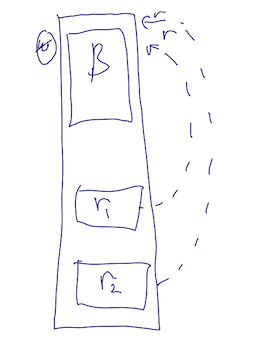
(b has lost write capability)
let mut b = B::new();
let w: &mut B = &mut b;
(b has temporarily lost both read and write capabilities)
Heap allocation: Box<B>
let a = Box::new(B::new());
a (as owner) has both read and write capabilities
Immutably borrowing a box
let a = Box::new(B::new());
let r_of_box: &Box<B> = &a; // (not directly a ref of B)
let r1: &B = &*a;
let r2: &B = &a; // <-- coercion!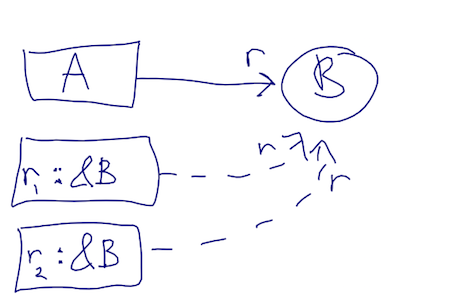
a retains read capabilities (has temporarily lost write)
Mutably borrowing a box
let mut a = Box::new(B::new());
let w: &mut B = &mut a; // (again, coercion happening here)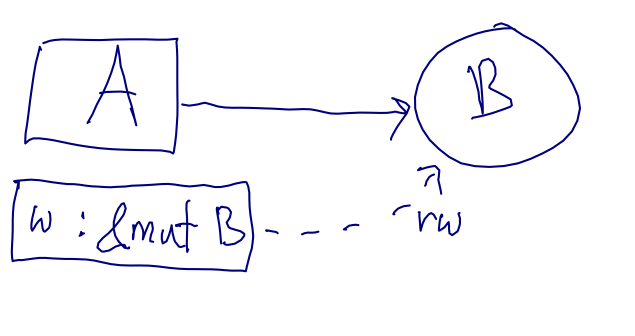
a has temporarily lost both read and write capabilities
Heap allocation: Vec<B>
let mut a = Vec::new();
for i in 0..n { a.push(B::new()); }
Vec Reallocation
...
a.push(B::new());| before | after | |
 |
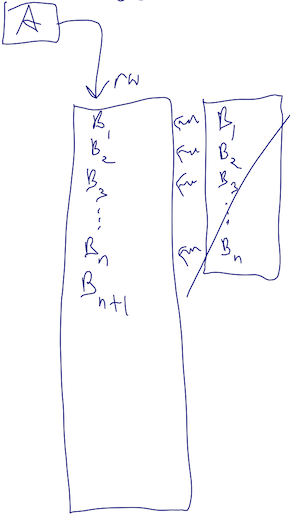 |
Slices: borrowing parts of an array
Basic Vec<B>
let mut a = Vec::new();
for i in 0..n { a.push(B::new()); }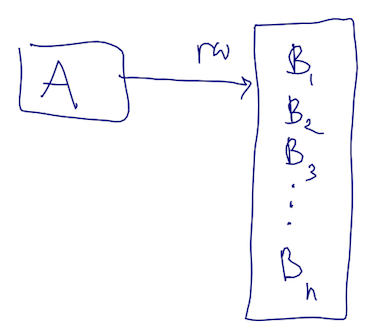
(a has read and write capabilities)
Immutable borrowed slices
let mut a = Vec::new();
for i in 0..n { a.push(B::new()); }
let r1 = &a[0..3];
let r2 = &a[7..n-4];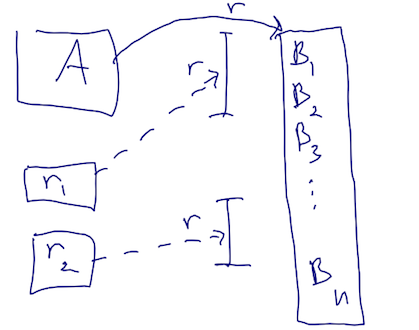
(a has only read capability now; shares it with r1 and r2)
Safe overlap between &[..]
let mut a = Vec::new();
for i in 0..n { a.push(B::new()); }
let r1 = &a[0..7];
let r2 = &a[3..n-4];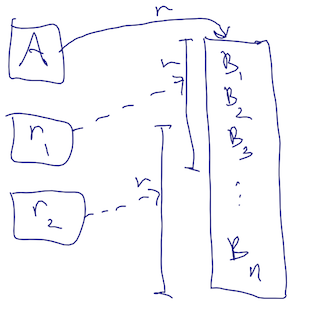
Basic Vec<B> again

(a has read and write capabilities)
Mutable slice of whole vec
let w = &mut a[0..n];
(a has no capabilities; w now has read and write capability)
Mutable disjoint slices
let (w1,w2) = a.split_at_mut(n-4);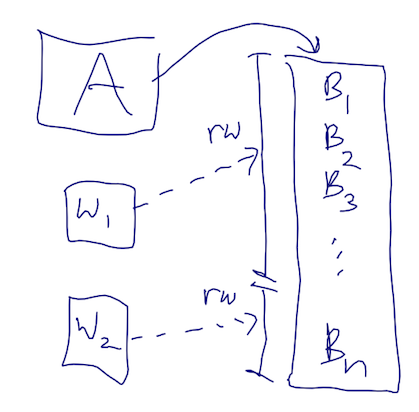
(w1 and w2 share read and write capabilities for disjoint portions)
Shared Ownership
Shared Ownership
let rc1 = Rc::new(B::new());
let rc2 = rc1.clone(); // increments ref-count on heap-alloc'd value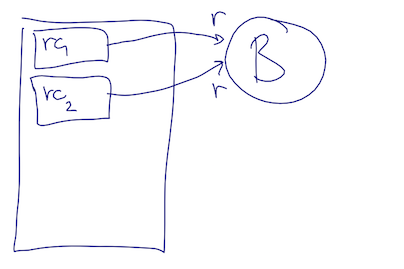
(rc1 and rc2 each have read access; but neither can statically assume exclusive (mut) access, nor can they provide &mut borrows without assistance.)
Dynamic Exclusivity
RefCell<T>: Dynamic Exclusivity
let b = Box::new(RefCell::new(B::new()));
let r1: &RefCell<B> = &b;
let r2: &RefCell<B> = &b;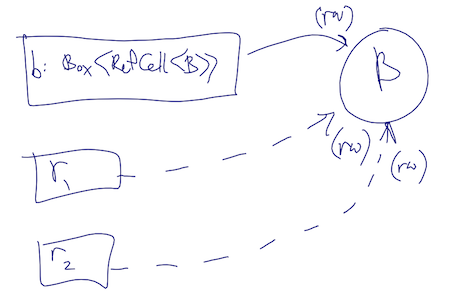
RefCell<T>: Dynamic Exclusivity
let b = Box::new(RefCell::new(B::new()));
let r1: &RefCell<B> = &b;
let r2: &RefCell<B> = &b;
let w = r2.borrow_mut(); // if successful, `w` acts like `&mut B`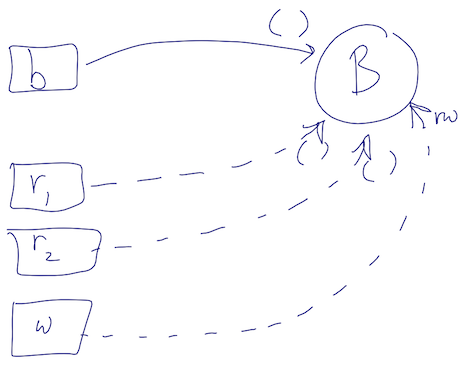
// below panics if `w` still in scope
let w2 = b.borrow_mut();Previous generalizes to shared ownership
Rc<RefCell<T>>
let rc1 = Rc::new(RefCell::new(B::new()));
let rc2 = rc1.clone(); // increments ref-count on heap-alloc'd value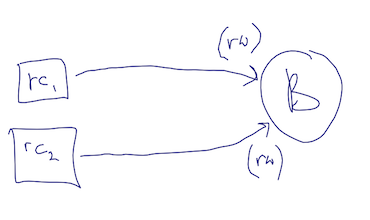
Rc<RefCell<T>>
let rc1 = Rc::new(RefCell::new(B::new()));
let rc2 = rc1.clone();
let r1: &RefCell<B> = &rc1;
let r2: &RefCell<B> = &rc2; // (or even just `r1`)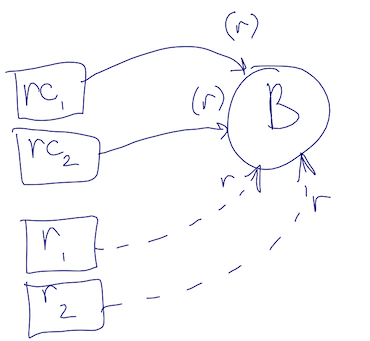
Rc<RefCell<T>>
let rc1 = Rc::new(RefCell::new(B::new()));
let rc2 = rc1.clone();
let w = rc2.borrow_mut();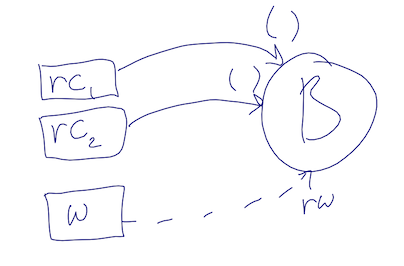
What static guarantees does Rc<RefCell<T>> have?
Not much!
If you want to port an existing imperative algorithm with all sorts of sharing, you could try using Rc<RefCell<T>>.
You then might spend much less time wrestling with Rust's type (+borrow) checker.
The point: Rc<RefCell<T>> is nearly an anti-pattern. It limits static reasoning. You should avoid it if you can.
Other kinds of shared ownership
TypedArena<T>Cow<T>Rc<T>vsArc<T>
Sharing Work: Parallelism / Concurrency
Threading APIs (plural!)
std::threaddispatch: OS X-specific "Grand Central Dispatch"crossbeam: Lock-Free Abstractions, Scoped "Must-be" Concurrencyrayon: Scoped Fork-join "Maybe" Parallelism (inspired by Cilk)
(Only the first comes with Rust out of the box)
std::thread
fn concurrent_web_fetch() -> Vec<::std::thread::JoinHandle<()>> {
use hyper::{self, Client};
use std::io::Read; // pulls in `chars` method
let sites = &["http://www.eff.org/", "http://rust-lang.org/",
"http://imgur.com", "http://mozilla.org"];
let mut handles = Vec::new();
for site_ref in sites {
let site = *site_ref;
let handle = ::std::thread::spawn(move || {
// block code put in closure: ~~~~~~~
let client = Client::new();
let res = client.get(site).send().unwrap();
assert_eq!(res.status, hyper::Ok);
let char_count = res.chars().count();
println!("site: {} chars: {}", site, char_count);
});
handles.push(handle);
}
return handles;
}dispatch
fn concurrent_gcd_fetch() -> Vec<::dispatch::Queue> {
use hyper::{self, Client};
use std::io::Read; // pulls in `chars` method
use dispatch::{Queue, QueueAttribute};
let sites = &["http://www.eff.org/", "http://rust-lang.org/",
"http://imgur.com", "http://mozilla.org"];
let mut queues = Vec::new();
for site_ref in sites {
let site = *site_ref;
let q = Queue::create("qcon2016", QueueAttribute::Serial);
q.async(move || {
let client = Client::new();
let res = client.get(site).send().unwrap();
assert_eq!(res.status, hyper::Ok);
let char_count = res.chars().count();
println!("site: {} chars: {}", site, char_count);
});
queues.push(q);
}
return queues;
}crossbeam
lock-free data structures
scoped threading abstraction
upholds Rust's safety (data-race freedom) guarantees
lock-free data structures
crossbeam MPSC benchmark
mean ns/msg (2 producers, 1 consumer; msg count 10e6; 1G heap)
|
108ns
|
98ns
|
53ns
|
461ns
|
192ns
|
| Rust channel |
crossbeam MSQ
|
crossbeam SegQueue
|
Scala MSQ | Java ConcurrentLinkedQueue |
crossbeam MPMC benchmark
mean ns/msg (2 producers, 2 consumers; msg count 10e6; 1G heap)
|
|
102ns
|
58ns
|
239ns
|
204ns
|
| Rust channel (N/A) |
crossbeam MSQ
|
crossbeam SegQueue
|
Scala MSQ | Java ConcurrentLinkedQueue |
See "Lock-freedom without garbage collection" https://aturon.github.io/blog/2015/08/27/epoch/
scoped threading?
std::thead does not allow sharing stack-local data
fn std_thread_fail() {
let array: [u32; 3] = [1, 2, 3];
for i in &array {
::std::thread::spawn(|| {
println!("element: {}", i);
});
}
}error: `array` does not live long enoughcrossbeam scoped threading
fn crossbeam_demo() {
let array = [1, 2, 3];
::crossbeam::scope(|scope| {
for i in &array {
scope.spawn(move || {
println!("element: {}", i);
});
}
});
}::crossbeam::scope enforces parent thread joins on all spawned children before returning
- ensures that it is sound for children to access local references passed into them.
crossbeam scope: "must-be concurrency"
Each scope.spawn(..) invocation fires up a fresh thread
(Literally just a wrapper around std::thread)
rayon: "maybe parallelism"
rayon demo 1: map reduce
Sequential
fn demo_map_reduce_seq(stores: &[Store], list: Groceries) -> u32 {
let total_price = stores.iter()
.map(|store| store.compute_price(&list))
.sum();
return total_price;
}Parallel (potentially)
fn demo_map_reduce_par(stores: &[Store], list: Groceries) -> u32 {
let total_price = stores.par_iter()
.map(|store| store.compute_price(&list))
.sum();
return total_price;
}Rayon's Rule
the decision of whether or not to use parallel threads is made dynamically, based on whether idle cores are available
i.e., solely for offloading work, not for when concurrent operation is necessary for correctness
(uses work-stealing under the hood to distribute work among a fixed set of threads)
rayon demo 2: quicksort
fn quick_sort<T:PartialOrd+Send>(v: &mut [T]) {
if v.len() > 1 {
let mid = partition(v);
let (lo, hi) = v.split_at_mut(mid);
rayon::join(|| quick_sort(lo),
|| quick_sort(hi));
}
}fn partition<T:PartialOrd+Send>(v: &mut [T]) -> usize {
// see https://en.wikipedia.org/wiki/
// Quicksort#Lomuto_partition_scheme
...
}rayon demo 3: buggy quicksort
fn quick_sort<T:PartialOrd+Send>(v: &mut [T]) {
if v.len() > 1 {
let mid = partition(v);
let (lo, hi) = v.split_at_mut(mid);
rayon::join(|| quick_sort(lo),
|| quick_sort(hi));
}
}fn quick_sort<T:PartialOrd+Send>(v: &mut [T]) {
if v.len() > 1 {
let mid = partition(v);
let (lo, hi) = v.split_at_mut(mid);
rayon::join(|| quick_sort(lo),
|| quick_sort(lo));
// ~~ data race!
}
}(See blog post "Rayon: Data Parallelism in Rust" bit.ly/1IZcku4)
Big Idea
3rd parties identify (and provide) new abstractions for concurrency and parallelism unanticipated in std lib.
Soundness and 3rd Party Concurrency
The Secret Sauce
SendSynclifetime bounds
Send and Sync
T: Send means an instance of T can be transferred between threads
(i.e. move or copied as appropriate)
T: Sync means two threads can safely share a reference to an instance of T
Examples
T: Send : T can be transferred between threads
T: Sync : two threads can share refs to a T
StringisSendVec<T>isSend(ifTisSend)- (double-check: why not require
T: SyncforVec<T>: Send?) Rc<T>is notSend(for anyT)- but
Arc<T>isSend(ifTisSendandSync) - (to ponder: why require
T:SendforArc<T>?) &TisSendifT: Sync&mut TisSendifT: Send
Send and Sync are only half the story
other half is lifetime bounds; come see me if curious
Sharing Code: Cargo
Sharing Code
std::thread is provided with std lib
But dispatch, crossbeam, and rayon are 3rd party
(not to mention hyper and a host of other crates used in this talk's construction)
What is Rust's code distribution story?
Cargo
cargo is really simple to use
cargo new -- create a project
cargo test -- run project's unit tests
cargo run -- run binaries associated with project
cargo publish -- push project up to crates.ioEdit the associated Cargo.toml file to:
- add dependencies
- specify version / licensing info
- conditionally compiled features
- add build-time behaviors (e.g. code generation)
"What's this about crates.io?"
crates.io
Open-source crate distribution site
Has every version of every crate
Cargo adheres to semver
Semver
The use of Semantic Versioning in cargo basically amounts to this:
Major versions (MAJOR.minor.patch) are free to break whatever they want.
New public API's can be added with minor versions updates (major.MINOR.patch), as long as they do not impose breaking changes.
In Rust, breaking changes includes data-structure representation changes.
Adding fields to structs (or variants to enums) can cause their memory representation to change.
Why major versions can include breaking changes
Cargo invokes the Rust compiler in a way that salts the symbols exported by a compiled library.
This ends up allowing two distinct (major) versions of a library to be used simultaneously in the same program.
This is important when pulling in third party libraries.
Fixing versions
cargo generates a Cargo.lock file that tracks the versions you built the project with
Intent: application (i.e. final) crates should check their Cargo.lock into version control
- Ensures that future build attempts will choose the same versions
However: library (i.e. intermediate) crates should not check their Cargo.lock into version control.
- Instead, everyone should follow sem.ver.; then individual applications can mix different libraries into their final product, upgrading intermediate libraries as necessary
Crate dependency graph
Compiler ensures one cannot pass struct defined via X version 2.x.y into function expecting X version 1.m.n, or vice versa.

A: Graph Structure |
B: Token API |
|
C: Lexical Scanner |
D: GLL Parser |
P: Linked Program |
In Practice
If you (*) follow the sem.ver. rules, then you do not usually have to think hard about those sorts of pictures.
"you" is really "you and all the crates you use"
- You may not believe me, but
cargois really simple to use - Coming from a C/C++ world, this feels like magic
- (probably feels like old hat for people used to package dependency managers)
Final Words
Final Words
(and no more pictures)
Interop
Rust to C
- easy:
extern { ... }andunsafe { ... } C to Rust
- easy:
#[no_mangle] extern "C" fn foo(...) { ... } Ruby, Python, etc to Rust
- see e.g.
https://github.com/wycats/rust-bridge
Customers
Mozilla (of course)
Skylight
MaidSafe
... others
Pivot from C/C++ to Rust
Maidsafe is one example of this
Rust as enabler of individuals
From "mere script programmer"
to "lauded systems hacker"
Or if you prefer:
Enabling sharing systems hacking knowledge with everyone
Programming in Rust has made me look at C++ code in a whole new light
Thanks
www.rust-lang.org
Hack Without Fear